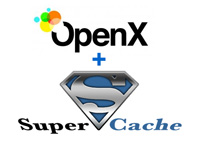 Many of our clients want to make money with their blogs. Primarily, they jump into Google Adsense and try to add banner advertising into the mix. When they get started, ContentRobot often recommends keeping it simple and first implement WP-Ads.
Many of our clients want to make money with their blogs. Primarily, they jump into Google Adsense and try to add banner advertising into the mix. When they get started, ContentRobot often recommends keeping it simple and first implement WP-Ads.
Then, as their blogs evolve, some of our clients' advertising needs become more sophisticated. Enter OpenX for those who seek the power of a more robust ad management and tracking solution. It works well for rotating various campaigns with detailed reporting capabilities.
Usually, upgrading the advertising solution happens in conjunction with a site's rising popularity. Now, the blog is getting lots of eyeballs as visitors are regularly checking out its content and clicking on the ads.
An unfortunate byproduct of this success, however, often causes some blogs to slow to a crawl or even go down. Hosts often tell our clients to try to reduce the server load on the site.
It's now time to install the WP Super Cache plugin, whose job it is to speed up WordPress by static caching. This means, it will spawn quicker HTML files that are served directly by Apache without processing comparatively heavy PHP scripts.
But here's a wrinkle. How can ads continue to rotate properly if the visitors are served a static HTML page? ContentRobot worked with OpenX guru, Erik Geurts, to determine the best way to configure OpenX 2.6 and WP Super Cache. The solution was to implement a "singe page" call code in the WordPress template.
What is a single page call?
It is a simple Javascript invocation method that uses a single HTTP request to deliver multiple banners to a web page. Instead of making several calls to the adserver for pages with multiple ads, a single call loads the page much faster, without the delays associated with rendering each zone individually.
You generate invocation code for a single page call at the "website" level, rather than at the "zone" level. In the Websites & Zones -> Website properties -> Invocation Code tab, begin by setting various options for the invocation code.
By using the "single page" call, your ads are now served up via Javascript, which is not cached by SuperCache.
With this advanced technique, the blog now:
- runs quicker (reducing the server load)
- allows WP Super Cache to do its job
- keeps those ads rotating and the stats calculating
Read Erik's case study on single page call.
